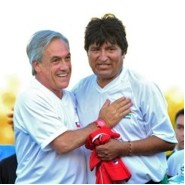Despite U.S. concerns that Bolivia cultivates problematic alliances with countries such as Venezuela and Iran, it is important to note that Bolivia also maintains good relations with nations the United States government considers to be allies, including many of Bolivia’s neighbors. For example, Chile benefits from strong economic and diplomatic ties to the U.S., but in recent years has also responded favorably to overtures from the Bolivian government to overcome historic conflicts and build pragmatic relationships based on common interests instead of ideological affinity. Although the American press and U.S. officials often highlight Bolivian President Evo Morales’ tendency to fire off scorching critiques of other leaders, his tone towards Chile has been consistently measured and diplomatic.
A Sea Change in Bilateral Relations?
After losing its coastal territory to Chile in the War of the Pacific (1879-1883), Bolivia broke off diplomatic relations and maintained a profound resentment toward its neighbor, blaming Chile for subsequent economic hardship and dependence. Except unfortunate high-level cooperation between military dictators during the 70s and early 80s during the “Plan Condor” era, the Morales administration marks the first improvement in bilateral relations in over a century. Furthermore, President Morales’ Chilean diplomatic initiatives highlight his ability and predisposition to establish and maintain relations with countries responsive to reasonable requests and expectations.
President Morales worked hard to build a rapport and bilateral ties with moderate-leftist Chilean President Michelle Bachelet, developing a 13-point diplomatic agreement shortly after his inauguration in 2006. The two leaders even indicated willingness to discuss allowing Bolivia special access to the ocean.
Sebastián Piñera replaced Bachelet on March 11, 2010. A wealthy businessman with conservative ideals, it might seem unlikely that leftist Morales could maintain the same positive diplomatic standing with Piñera due to their divergent political stances. However, Morales’ initial remarks about Piñera’s fledgling presidency indicate a desire to continue improving relations with his new Chilean counterpart.

During Morales’ official visit to Santiago for Piñera’s inauguration, the two leaders played a friendly soccer match to cement their future productive relationship. According to Piñera, “It was a unifying match. I think it’s lovely that President Evo Morales of Bolivia and the future president of Chile played together on the same team,” and explained that he had accepted Morales’s invitation only after a “gentleman’s agreement” that all players would be fifty or older.
Watch the video (in Spanish) here: Presidents Piñera and Morales Discuss a Friendly Soccer Match.
Measured Observation of National Holiday
On March 23 Bolivia celebrated its annual dour recognition of “Sea Day,” commemorating their historic loss of coastal territory. Although President Morales reasserted his determination to regain access to the Pacific, he expressed reasonable parameters and objectives for achieving this goal. “Happily a good relationship exists [with Chile],” Morales remarked, pointing out, “We can only resolve [our concerns] when trust exists [between the two countries].” (Los Tiempos 3/23/10).
Morales also commented that, “I can’t make demands while Chile is still going through a painful time,” following the recent earthquakes that devastated a wide region of the country. According to Morales, when he attended Piñera’s inauguration the Chilean president briefly affirmed his hope to maintain good relations. “Our peoples’ diplomacy is building the most appropriate scenario to achieve our access to the sea, which has been systematically postponed for 131 years by our countries’ oligarchs,” Morales stated. (Los Tiempos 3/23/10).
Commemorative activities on March 23 included the first formal appearance of the armed forces’ inclusion of the wiphala, the flag of the Incan Empire now recognized as a symbol of Bolivia’s indigenous peoples, on their uniforms and coat of arms. The military also debuted their controversial new motto, “Homeland or death; we will prevail.” It is symbolic that Sea Day marked the change from their old motto, “Subordination and perseverance: Long live Bolivia; death to Chile.”
Morales Administration Ignores Recent Press about New Chilean Consul
In mid-March, the Piñera administration appointed Jorge Canelas as consul, the highest ranking diplomatic official in Bolivia, as the countries have yet to reinstate ambassadors. Soon after the announcement, an email from 2000 sent by Canelas to another diplomat surfaced, stating that, “the best state for our relationship with Bolivia is to have no relationship at all.” He further stated that Bolivian factions would attempt to use improved relations for their own political purposes. Although members of both the Chilean and Bolivian opposition attempted to use the email as fodder for bilateral friction, Bolivian Chancellor David Choquehuanca dismissed the comment after a conversation with his Chilean counterpart. This is a prudent decision, as Bolivian political dynamics and executive willingness to improve relations have changed significantly since the Banzer administration, when Canelas wrote the message.
New Bilateral Rapport Sets Important Precedent
Morales’ positive rapport with the Piñera government breaks the stereotype of strong bilateral relations based solely on shared anti-American dogma or a “Bolivarian” alliance. It reflects openness to democratic ties that mutually benefit both parties, in spite of their leaders’ ideological stances. The continued positive rapport and fluid bilateral relations between Chile and Bolivia are an important demonstration that it is possible to overcome profound resentment and acute historical grievances, even without reinstating ambassadors. Insisting on the continuation of rigid procedures, such as development policy or annual drug control certification, closes the door to more productive, transparent relations with all nations. Undoubtedly, the process of rebuilding broken bilateral relations demands open minds and great flexibility on both sides, as well as a willingness to re-evaluate longstanding, established policies and practices, perceived as institutional and impossible to change. Within these parameters, perhaps diplomatic reconstruction could even occur in less than 130 years.
